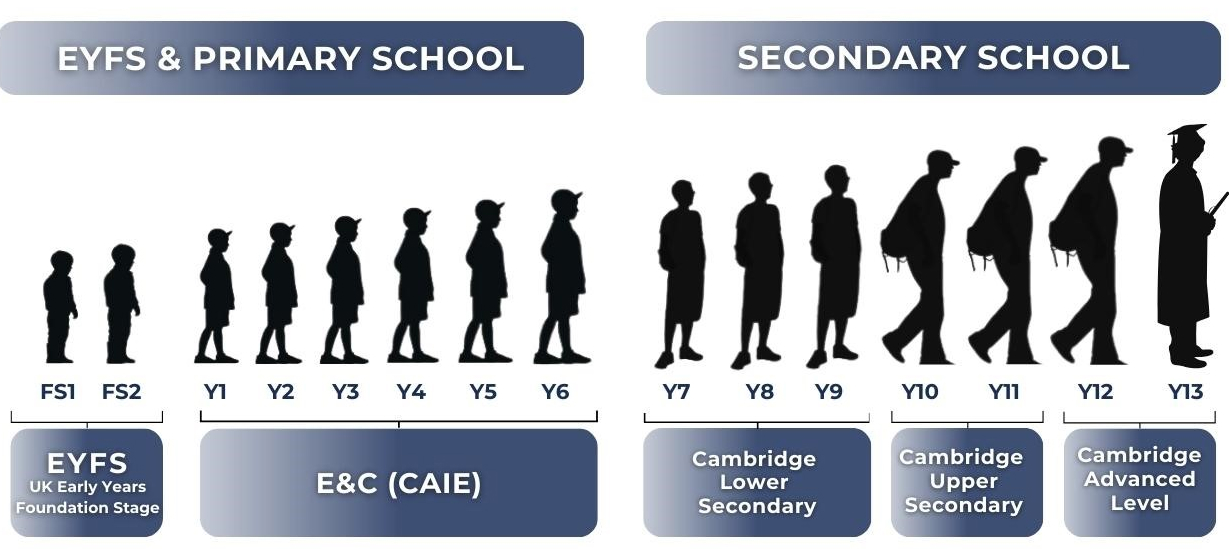Home >
Curriculum >
Academic Overview
Academic Overview
Academic Overview
Curricula Offered
Welcome to Invictus International School. Invictus is a group of schools that has expanded regionally to meet the demands of modern 21st Century education in a constantly changing world.
Our mission to be a leading educational institution, where all learners develop holistically and are given every opportunity to be successful, can be seen by the diverse student-centred approach and the curricula we offer at Invictus.
Learning Journey in Invictus International School

 |
The UK Early Years Foundation Stage (EYFS)The UK Early Years Foundation Stage (EYFS) curriculum fosters learning and development through giving each unique child the opportunities to interact in positive relationships and enabling environments. The EYFS system has educators understand that every child is a unique child, who is constantly learning and can be resilient, capable, confident and self-assured. Teachers will take time to understand and observe each child’s development and learning, assess progress, and plan for next steps. Next, children learn to be strong and independent through positive relationships. Positive relationships are fostered by teachers who are sensitive and responsive to the child’s needs, feelings and interests; supporting the child’s own efforts and independence. The last theme in the UK EYFS curriculum is enabling environments. Children learn and develop well in enabling environments, in which their experiences respond to their individual needs and there is a strong partnership between practitioners and parents and carers.
Students will learn and be assessed on the following areas with practical and engaging activities planned throughout the week to target each area.
● Communication and language
● personal, social and emotional development
● physical development
● literacy
● mathematics
● understanding the world
● expressive arts and design
|
 |
Primary CurriculumThe Primary curriculum is based on the National curriculum of England learning objectives and is for young learners aged 5 to 11 years old. It is used in primary schools around the world and it develops young learners who are confident, responsible, reflective, innovative and engaged.
We use a variety of programmes to help support our core learning areas; English, mathematics, and science. Our English lessons are taught using a text based approach, encouraging children to develop a lifelong love of reading. The texts are CLPE approved and recommended high quality texts to ensure students are stretched, challenged and engaged.
For maths and science we use White Rose which is a programme designed to encourage students to apply their learning in real-life scenarios including practical, problem solving style experiments and activities.
All of the programmes provide a comprehensive set of progressive learning objectives. The objectives detail what the learner should know or what they should be able to do in each year of primary education. The curriculum provides a structure for teaching and learning and a reference against which learners' ability and understanding can be checked.
|
Cambridge Secondary CurriculumThe Cambridge Secondary Curriculum is used in over 155 schools in over 50 countries worldwide. Cambridge Secondary Curriculum is jointly developed by the London-based Fieldwork Education and front-line educators from more than 100 international schools around the world, including the UK, the US and Australia. It is an international course in the true sense. The Cambridge Secondary Curriculum is a concepts based curriculum design that provides theme-based units featuring learning goals that outline the knowledge, skills and understanding needed across all subjects as well as developing personal dispositions to help students become more internationally minded. The Cambridge Secondary Curriculum promotes learner traits recognised as essential for future success. The full range of units cover adaptability, balance, belief, celebration, challenge, collaboration, communication, community, competition, consequences, courage, creativity, curiosity, development, discovery, entrepreneurship, identity, interpretation, justice, leadership, reflection, relationship, renewal, resilience, resolution, respect, responsibility, risk, structures and tradition.
|
International General CErtificate of Secondary Education (IGCSE)The Cambridge IGCSE is the world’s most popular international qualification. IGCSEs is a preparation for the Cambridge International A-Levels, and usually take two years to complete. Assessment ranges from written to oral tests, as well as practical exams and coursework. Students get to choose from a range of different subjects. The final results are assessed using internationally-recognised A* to G grades. The exam papers are all marked centrally in the UK. The Cambridge IGCSEs give you the freedom to choose a course of study that is right for you. Your chosen subjects should fit with your career goals or plans for further education.
|
Cambridge International A-Levels (Advanced Level)The Cambridge International A-Level (Advanced Level) is a subject-based qualification conferred as part of the General Certificate of Education, as well as a High school completion qualification offered by established examination boards in the United Kingdom, with more than 55 subject choices available to choose from. Considered the 'Gold Standard' qualification. Obtaining an A-Level is generally required for university entrance, with universities granting offers based on grades achieved. Cambridge International A-Levels generally take two years to complete. Students normally take 3-4 A-Levels in their first year, and most cut back to 3 in their second year. This is because university offers are normally based on 3 A-Levels. Unlike other level 3 qualifications such as the International Baccalaureate, A-Levels have no specific subject requirements, so students have the opportunity to combine any subjects they wish to take. However, students normally pick their courses based on the degree they wish to pursue at university: most degrees require specific A-Levels for entry.
|